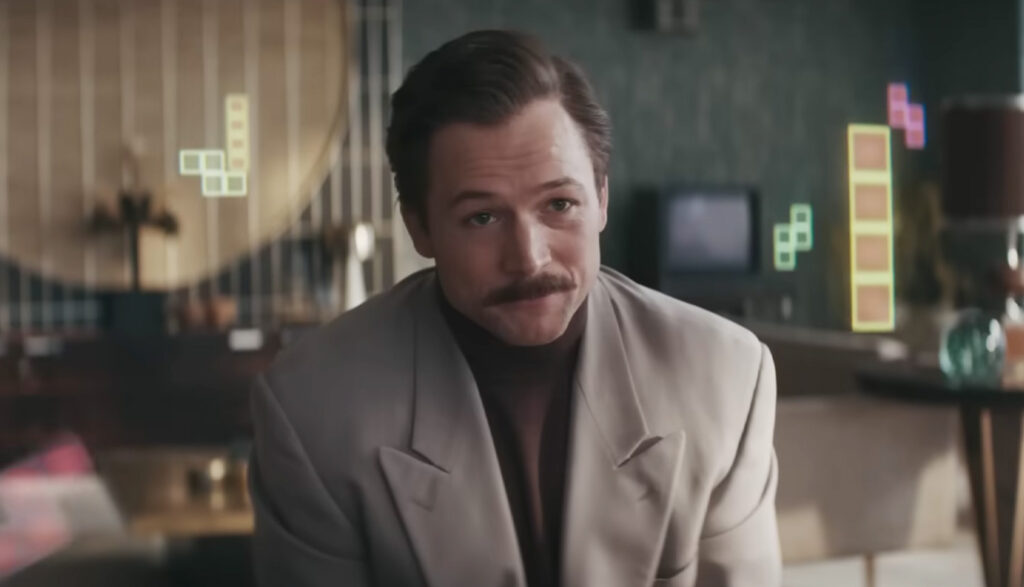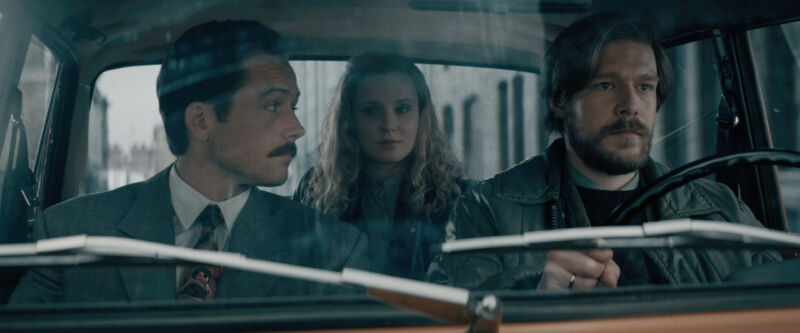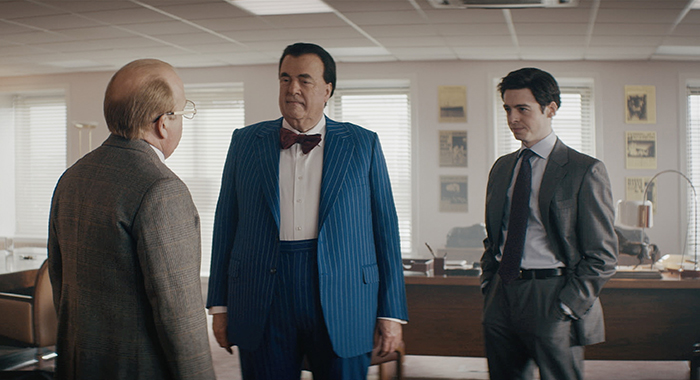With Sony’s Gran Turismo primed to imminently hit North American theatres at the time of writing, it’s hard to believe that it’s not even 2023’s first stranger-than-fiction, video game-themed true story movie. Hell, Gran Turismo won’t even be this year’s last, considering that Sony also have the 2021 Gamestop stock fiasco-inspired Dumb Money headed to theatres next month! If ever there was a year to prove that people outside of the gaming community are ready to believe in the success of video game-themed stories, it’s 2023!
Going back to the fact that Sony didn’t even produce 2023’s first unbelievable-yet-somehow-true video game-themed movie however, even with two offerings in that tiny, fledgling subgenre, well, who did? Amazingly enough, it was Apple, who tossed an interesting biopic/thriller combo onto Apple TV+ within a very crowded Spring quarter for theatrical movie releases. While Gran Turismo may not be a household name as well, there’s no way you won’t recognize the iconic video game behind Apple’s offering; Tetris!

Apple’s own true-story video game-themed drama, simply titled ‘Tetris‘, chronicles the story of how one brilliant, highly addictive video game indirectly contributed to the collapse of the USSR in the late 80’s, and how a cutthroat war for its distribution rights managed to unite the world in a time of great existential peril. Much like Sony’s Gran Turismo movie, it’s another triumphant celebration of the power of a great video game, and how it can legitimately change the world in the right hands. Like I said, 2023 is the year that video games seem to have become a valid form of demanded art, not just within the eyes of gamers, but now within the eyes of the general population to boot!
Is Tetris actually a good movie though? Fortunately, yes, it is. It’s absolutely absurd in some places, even by the standards of this undeniably strange true-life tale, but as a fun, colourful rendition of one of the gaming industry’s most surprisingly tumultuous early chapters, it’s also a standout feel-good flick that will appeal equally to gamers and non-gamers alike. It could have used a bit less circular arguing about ownership rights and communistic rhetoric, leading to some stubborn dry spots that clash poorly with the rest of this movie’s high energy, but even if it isn’t quite as consistently fun as the actual game of Tetris, Apple’s Tetris biopic still manages to stand out as a proudly romanticized account of a true story that is nonetheless pretty bonkers on its own.
Tetris stars Taron Egerton as Henk Rogers, the man who would be instrumental in bringing Tetris to the masses. It was Rogers that encouraged Nintendo to package Tetris alongside their then-revolutionary gaming handheld, the Game Boy in 1989 (it was originally going to be packaged with Super Mario Land), and that’s merely one accomplishment within a series of hostile, unpredictable negotiations that eventually saw Nintendo winning the bulk of distribution rights to Tetris from the clutches of the Russian government. This is all while Tetris’ actual creator, Alexev Pajitnov, played in this movie by Nikita Yefremov, sees a failing communist regime seizing the rights to his definitive game, and threatening to leave him humiliated and penniless as it aspires to reap the profits, in a bid to try and save a dying USSR.
Yes, far more went on behind the scenes with Tetris than most of the public outside of the Iron Curtain could imagine, and Apple’s Tetris movie certainly isn’t shy about representing that. Egerton’s Henk Rogers is a very lovable lead, on this note, delivering one of Egerton’s best performances to date as a struggling programmer that saw Tetris’ potential early, and risked everything he had to give the game its proper due on a global scale. Egerton’s sheer energy and charisma does a lot of heavy lifting during the many Moscow-set scenes in particular, where the last days of the USSR are portrayed through a lot of bleak grey and brown cinematography, further complemented by intentionally dour and dry Russian performances that emphasize just how bad things had gotten in Russia during the last days of the Cold War.
“Thus, as a feel-good biopic, Tetris is exceptional.”
The age-old Hollywood tale of someone that risked everything to make the world a better place, and did it successfully, is certainly not new. Hell, Sony’s Gran Turismo movie is built around the exact same hook. Where Tetris really stands out however is through how successfully it hides those familiar components within a story that’s not presented in the way you would expect. This is on top of Tetris managing to do a great job of keeping viewers guessing, even when its results are a foregone conclusion. We know that Rogers and Pajitnov eventually win the day, considering that Tetris is one of the most widely recognized, and frequently re-released video games in history now, but how they manage to do it is never immediately obvious. On that end at least, Tetris makes for a legitimately compelling watch, containing no shortage of negotiation gymnastics that are accessible enough for the everyperson viewer, but still detailed enough to be interesting and not immediately obvious.
Thus, as a feel-good biopic, Tetris is exceptional. It perfectly walks the line between being inspiring and being suspenseful, before eventually culminating in a truly heartwarming victory that you can’t help but smile at. Chances are, after all, that most people have played at least one game of Tetris in passing at some point during their lives, and as Henk Rogers claims, it’s simply impossible to deny that the game marks the perfect marriage between artistry and mathematics. There’s a primal, highly satisfying intellectual addictiveness to Tetris, a brilliant idea that even the Iron Curtain couldn’t contain in the end. Those who have tried the game themselves, whether once or thousands of times, can thus understand especially easily why it deserved to be shared with the world, and how, in the process, it transcended being a video game, and contributed to the rise of a new era for Russia and the global gaming industry alike.
As much as the overall story of how Tetris made it to the world is utterly fascinating, and legitimately insane in some places, the nitty-gritty of Apple’s Tetris movie does nonetheless tend to get bogged down in a lot of corporate tug-of-war that struggles to be engaging in high doses. The filmmakers appear to try and compensate for this by producing Tetris as just as much a paranoid Cold War thriller as it is an inspiring biopic, two ingredients that can be challenging to seamlessly blend. In Tetris’ case, while this movie definitely nails its celebration of the foundational video game, and how some determined dreamers brought it to the world, it can go off the rails a bit when it tries to crank up its thriller elements.

This is because, for all of its showiness about highlighting the desperate brutality of the failing USSR, Tetris never truly manages to feel all that imposing. The rest of the movie is so energetic, and almost cute even, that it veers wildly off-course once it tries to inject Soviet muscle into proceedings. There are a couple of Soviet intimidation scenes that manage to be decent, but most of them do fall a bit flat, ultimately being undone by the rest of Tetris’ energized flavour. This feels especially evident as Tetris culminates in a truly ridiculous climactic car chase, backed by a Japanese cover of Bonnie Tyler’s, “Holding Out for a Hero” no less, something that definitely didn’t occur in real life (as the actual Henk Rogers has publicly emphasized), but nonetheless feels like a necessary evil to finish this movie’s particular take on the tense battle for global Tetris rights.
Again though, this is where Tetris can play fast and loose with history to a fault. Through wanting to honour its roots in gamer culture, Tetris seems more concerned with being exciting than being fully authentic. Even then though, its paranoid thriller element works to mixed effect, ultimately not feeling all that scary or uncomfortable, even when it desperately wants to hammer home what’s at stake. The plight and malaise of the late-era USSR is sold pretty well, especially when Pajitnov is portrayed as a burdened genius that just wants to do right by his family, but perhaps Tetris may have been better off ditching its thriller elements entirely. Even so, at least the movie doesn’t struggle to entertain during these heightened moments, despite it blatantly straining the limits of credibility in the process.
Tetris’ odd mix of gonzo Cold War thriller and corporate pissing match is all brought together by the hyper-energized production eye of Marv Films, best known for their work on the Kingsman and Kick-Ass movies. That might give somewhat of an indication of the kind of tone Tetris tries to achieve in response to so much weighty corporate conflict and Russian political intrigue.
It’s a pot of strange ingredients to be sure, but there is something undeniably fun about Tetris’ pixel art-flavoured directing flourishes, among other moments of video game-themed style. Those charming, gamer-baiting moments definitely take a backseat during a more drab, scattered second act in particular though, where most of Tetris’ dialogue-heavy negotiating and Cold War-era communism commentary seems to be present. That’s the point where Tetris follows a first act that sees it practically flirting with the concept of being a Cold War comedy as well, another potential direction that it might have achieved, had it fully committed to it.
“Through wanting to honour its roots in gamer culture, Tetris seems more concerned with being exciting than being fully authentic.”
There’s a clear love for the game of Tetris throughout Apple’s biopic though. That’s just undeniable. As much as the movie’s peppy direction can be stymied by a weightier script that doesn’t totally mesh with it all the time, said direction still creates a lot of entertainment value for those genuinely interested in Tetris’ video game namesake. Even if you’ve never touched a video game before in fact (you poor soul), Tetris thrives as being livelier and more stylistically distinct than the bulk of Hollywood biopics, helping it stick out in one’s mind as a creatively inspired representation of how we came that close to being denied one of the world’s greatest video games back in the 80’s.
Tetris can be a very weird movie, oscillating between Soviet-era depression and sugary video game celebration with reckless abandon. Even so, as much as its true-events credibility can be questionable at times, it’s an undeniably entertaining biopic with style to spare, one that isn’t ultimately defeated by its frequent moments of directionless corporate squabbling and uneven thriller elements.
Taken as a whole package, Tetris is a better biopic than it is a thriller, but it nonetheless presents a mostly interesting, often genuinely insane account of one of the video game industry’s toughest challenges, and greatest triumphs. It stands apart thanks to its frequently fun and lovable direction as well, even if that comes at the expense of further deflating its aims to also be a dread-filled Cold War thriller. Regardless, Tetris is easily more fun than many other Hollywood biopics, if nothing else, and if you happen to enjoy video games especially, you’ll be even more moved by its infectious, feel-good story of creativity winning out over greed.

Like an excitable child recounting a story about how they discovered their favourite piece of art, Tetris can present a hyperactive, confused and sometimes unbelievable account of events that are already pretty unbelievable in their real-life documentation. Even when you’ll no doubt wonder if it’s embellishing things just a little bit though, you’ll nonetheless find yourself sucked into the tale spun by Tetris with ease, content to accept that its exaggerated weirdness can still thrive as part of its charm.

